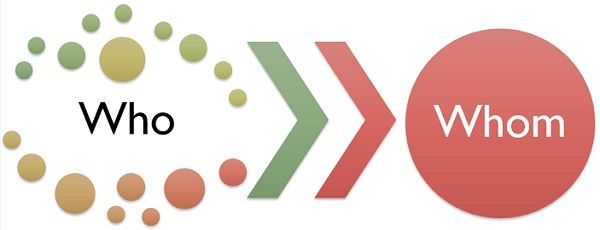
While we use ‘who‘, when we want to talk about the subject of a sentence, we use ‘whom‘ if we talk about the object of the verb. Who and Whom are the class of wh-word, that are commonly used to ask questions or introduce a clause in a sentence.
The main object of using these two words in a sentence is to know about people or a person rather than things. Now, let’s understand the difference between these two words with the help of an example:
- Who are you? and Whom are you talking to?
In the given sentence, we’ve used who to know about the person of discussion, whereas whom is used to imply a person to which the particular action, i.e. talking, is directed.
Content: Who Vs Whom
Comparison Chart
| Basis for Comparison | Who | Whom |
|---|---|---|
| Meaning | Who is used to describe, which person, i.e. the one who does the action. | Whom is a interrogative pronoun, which also talks about the person who receives the action. |
| Pronunciation | huː, hʊ | huːm |
| Pronoun | Subjective Pronoun | Objective Pronoun |
| Examples | Who is coming with me at the pool party? | Whom should I rely on this matter? |
| Who likes burger? | Whom do you doubt? | |
| Who is the manager of this company? | To whom should I meet? |
Definition of Who
In English, we use the word who to ask questions about which person or people not for things or objects, i.e. to know about the subject of the verb. Subject refers to the person who performs an action, meaning that the subject is the doer of the action. Now let’s understand where to use who in our sentences:
- It is used as the subject, to ask which person:
- Who is that monk?
- Who is your father?
- Who has got the keys?
- Who entered your room last night?
- It can also be used to express which person you are addressing or to add a clause that gives some more information about the person discussed:
- It may be Hrithik, who knocked on the door.
- Palak is one of those, who loves to play with kids.
- It can also be used to ask the name of the person or group of people:
- Who is the President of India?
- Who is the captain of our cricket team?
- It can also be used to talk about the person in a particular way:
- Who likes coffee?
- Who is older?
Definition of Whom
Basically, whom is nothing but the objective form of the word ‘who’, which is often used in the formal sense as an object of the verb. It tells you which person is receiving the action. You can use whom, in the following ways:
- To add relative clauses in the sentence and add further information:
- She called a lady, whom she met yesterday.
- I wish I could be the person, whom I always dream.
- David used to appreciate his student’s efforts, whom he teaches.
- To ask questions:
- Whom should I report?
- Whom did they take help?
- It can be used before a preposition, to ask an indirect question, about someone:
- I don’t know, for whom she is sacrificing her stardom.
- He just asked me, with whom I was going to London.
Key Differences Between Who and Whom
The difference between who and whom can be drawn clearly on the following grounds:
- The word ‘who’ is used to refer to the which person or people, we are talking about. As against, ‘whom’ is used when we talk about the person to which the action is directed.
- Who is used as a subjective pronoun, i.e. it tells you about the subject of the verb. On the contrary, whom is an objective pronoun, that highlights the object of the verb.
- Example: Who will be the winner of essay competition?
Whom did you ask for the dinner?
Examples
Who
- Who is your doctor?
- Who did the mistake?
- Who is going to score maximum marks in the class?
Whom
- Whom did she call?
- Whom did you see last week at the park?
- Whom did he get engaged?
How to remember the difference
A simple and easy trick to memorize the difference between who and whom, is when you can put he/she in place of the word, you can use who, but if it is better replaced with him/her, you should use ‘whom’.






Leave a Reply